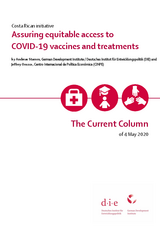Costa Rican initiative
Assuring equitable access to COVID-19 vaccines and treatments
Stamm, Andreas / Jeffrey OrozcoThe Current Column (2020)
Bonn: German Development Institute / Deutsches Institut für Entwicklungspolitik (DIE), The Current Column of 4 May 2020
The world is eagerly awaiting a vaccine and treatments required to contain the human, social and economic consequences of the COVID-19 pandemic. But how can affordable access to medical innovations be guaranteed, once effective and secure solutions are found? And how can we avoid that powerful governments secure vaccines and drugs for their own citizens, while poorer countries are side-lined? The Costa Rican government has proposed to the WHO that it should lead a global effort to pool intellectual rights on technologies that are useful for the detection, prevention, control, and treatment of Covid-19. Costa Rica itself is working on scientific contributions to COVID-19 treatment based on the use of blood plasma.
The right to health (Article 25 of the 1948 Universal Declaration of Human Rights) entitles individuals to receive the goods and services required to assure a decent standard of medical and health care. Currently, this refers to affordable access to vaccines, medicine, devices (protective masks) and treatment equipment (ventilators). However, per capita health expenditure varies greatly between countries. In 2017, it was more than USD 5000 in Germany, but only USD 69 in India, USD 31 in Mali and USD 25 in Ethiopia. Thus, it is clear that many states are financially not in a position to fulfil the right to health but require international support to do so.
A clear tension exists between the human right to health and the logics of medical innovation. This is especially the case when innovation follows significant investments in research and development. In principle, any small publicly funded lab anywhere in the world might make a discovery, leading to a crucial innovation. The inventors would then mainly be rewarded by academic reputation, and their innovation might easily be brought into the global public domain. Pharmaceutical companies across the world could then produce vaccines and drugs at the required quantities. It is, however, more likely that inventions occur in private labs in the Global North, as there is still a very pronounced North-South divide in health R&D. In 2009 (latest available data), public and private actors globally invested USD 240 billion in health, 89 percent of it in high-income countries. OECD countries host three quarters of all clinical trials in pharmaceuticals. The private sector accounts for 60 percent of global health research and development. We may debate the ethical dimension of profit making in the health sector, but research clearly indicates that prospects of profit do accelerate innovation. Competition among medical tech companies may bring down costs as long as monopoles are avoided. Drug development is – under normal conditions – a long-term (10-15 years) and risky business: Depending on the type of drug and approval process, only between 7 percent and 45 percent of all drugs entering the clinical trial phase receive approval to be marketed. So, the main challenge is to maintain incentives for private medical research, while leaving no one behind, once effective and secure solutions have been found.
Health lawyers, and researchers from across the world have welcomed Costa Rica’s initiative. It may enable generic drug makers to manufacture and sell their products at much lower prices than those that might be charged in the current global medical crisis. The Medicines Patent Pool (MPP), founded in 2010 by UNITAID, can serve as a role model for the proposal. Between 2010 and 2018, public and private patent holders allocated 18 licenses for high-impact drugs to MPP, which in turn sublicensed 24 manufacturers (for example in India and South Africa) to produce and distribute low-cost generic versions of the drugs in 136 countries.
A similar model can work for COVID-19 vaccine and other related healthcare elements. Large companies might be willing to voluntarily license their patents to MPP or UNITAID, taking into consideration human suffering and economic losses due to the pandemic. Israeli company Medtronic recently made available to anyone the full design specifications and software codes for its portable ventilator. If other companies hesitate to follow this example, they would take reputation risks. Even if licensing of relevant drugs and items had to be paid for, this might happen at a reasonable price, if negotiated at large scale and at multilateral level.
Andreas Stamm is a researcher in the research programme “Transformation of Economic and Social Systems” at the German Development Institute / Deutsches Institut für Entwicklungspolitik (DIE).
Jeffrey Orozco is a researcher at the Centro Internacional de Política Económica para el Desarrollo Sostenible (CINPE)
To the spanish version of this Current Column
This Current Column is part of a special series that is exploring the developmental and socioeconomic consequences of the corona crisis. You can find more articles like this on The Current Column’s overview page.
- Coronavirus as an opportunity for international cooperation
- Why social protection is crucial in the corona crisis
- How we will need to tackle climate migration post-coronavirus
- Parallels between the corona pandemic and climate change
- What we can learn from and about Africa in the corona crisis
- How the EU and rising powers can shape their future sustainably
- How the corona crisis is calling into question the “right to the city”
- Is the coronavirus threatening a developing-country debt crisis?
- Is the pandemic deepening the digital divide?
- Tackling the pandemic without doing away with democracy
- How the international financial institutions are responding to the pandemic
- Assuring equitable access to COVID-19 vaccines and treatments
- The marginalised as the weakest link in pandemics
- Incentives and rules for fair supply chains
- From COVID-19 to climate action
- How to respond inclusively to COVID-19 in the interests of the common good
- Why the Corona crisis is particularly difficult for right-wing populist governments
- What does the EU recovery plan mean for the European Green Deal?
- Growing inequality can worsen the pandemic’s effects
- COVID-19 has not killed global populism
- A fundamental transformation of tax systems is needed in the wake of Covid-19
- Germany’s EU Council Presidency faces a monumental task


